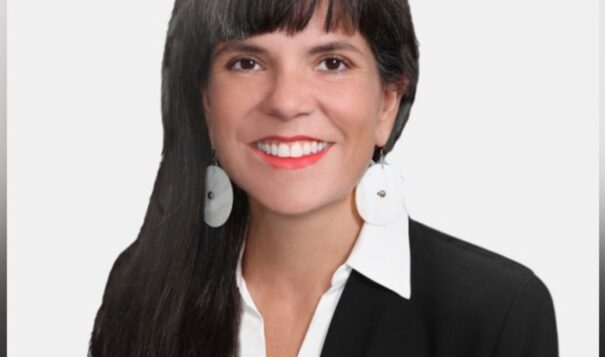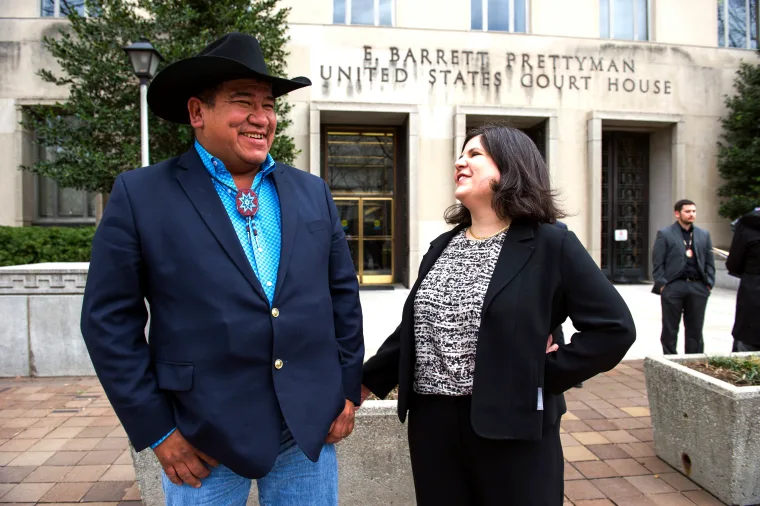News Based on facts, either observed and verified directly by the reporter, or reported and verified from knowledgeable sources.
Nicole Ducheneaux, Native rights champion, ‘warrior lawyer’ dies
 Nicole Ducheneaux, an attorney who represented the Cheyenne River Sioux Tribe in its fight against the Dakota Access pipeline, died Friday, July 14, 2023, from unknown causes. (Courtesy photo, Big Fire Law and Policy Group)
Nicole Ducheneaux, an attorney who represented the Cheyenne River Sioux Tribe in its fight against the Dakota Access pipeline, died Friday, July 14, 2023, from unknown causes. (Courtesy photo, Big Fire Law and Policy Group)
Ducheneaux spent her legal career fighting for the rights of tribes, tribal organizations and individuals, including representing the Cheyenne River Sioux Tribe in its fight against the Dakota Access pipeline
A Lakota lawyer who represented the Cheyenne River Sioux Tribe in its fight against the Dakota Access pipeline and spent her career fighting to protect Indigenous rights died on Friday, July 14, 2023.
Nicole “Nikki” Ducheneaux, 44, Cheyenne River Lakota, died from undisclosed causes in Omaha, Nebraska. Her father announced his daughter’s death on the evening of Sunday, July 16.
“This is the hardest thing I’ve ever done in my life,” Franklin Ducheneaux said. “Our beautiful daughter, Nikki, died suddenly early Friday night. Our lives have been shattered.”
Ducheneaux was a founding partner of the Big Fire Law and Policy Group based in Omaha. She began her legal career in Montana as a public defender. In 2012, she joined the law firm Fredericks Peebles and Morgan in Omaha, the predecessor of Big Fire Law Firm. There, she advocated for tribes and tribal entities across the United States and was a “formidable and innovative litigator,” according to a social media post by Big Fire Law Firm.
Ducheneaux argued cases before state, tribal and federal courts, as well as appellate courts of all varieties, including the U.S. Supreme Court. She quickly rose in the ranks at Fredericks Peebles and Morgan, where she became a litigation partner in 2015.
In 2019, she was one of the founding equity partners of Big Fire Law and Policy Group, serving as the head of litigation, where she established a reputation for “tireless and passionate advocacy,” according to Big Fire.
“As a founding equity partner, Nikki was constantly focused on the best interests of the Firm,” Big Fire said. “But beyond her work, she was also a devoted and loving mother who always made time for her children, to support them in their activities, and passions.”
In addition to her litigation work, Ducheneaux championed young Native lawyers by providing mentorship and guidance to them. Big Fire characterized her as “kind, compassionate, and always available to assist family or friends in times of need.”
Ducheneaux is survived by her children, Sidney Moenning, Esther Moenning and Reneé Ducheneaux; her parents Franklin and Ernestine Ducheneaux; and siblings, Patricia Jollie, Pamela Herring, Joan Doring, Frank Ducheneaux and Christopher Ducheneaux, along with many uncles, aunts and cousins.
A GoFundMe account was set up to raise funds for legal and other expenses.

Her cousin, Wayne Ducheneaux Jr., said he and his cousin both had “big shoes to fill in the legacy department.”
“From early on, we really kind of bonded over what that is like,” said Ducheneaux, who serves as executive director of the Native Governance Center.
His father, Wayne Ducheneaux Sr., was a former president of the National Congress of American Indians and two-time chairman of the Cheyenne River Sioux Tribe. Nicole Ducheneaux’s father Franklin served as executive director of NCAI in 1970 and as an attorney for two House committees, where he helped draft many of the most important Native laws enacted by Congress from 1973-1990.
Wayne Ducheneaux Jr. said he last saw his cousin at a dinner in April at the University of South Dakota, where Franklin Ducheneaux was being honored as the first graduate of the USD law school.
“The last thing we talked about was our families and our kids and her new baby girl being so close in age to my baby girl and our hope that they grow up together having the same kind of bond and connection she and I have,” he said.
“The loss of Nikki leaves a huge hole in our heart as a family, our tiospaye, our tribe and Indian Country. We lost the epitome of the term ‘warrior lawyer’ and she will be greatly missed by all.”
Those who knew Nikki Ducheneaux took to social media this week to express their shock and sadness at her sudden death:
- “I met Nikki when I was 16, struggling and disconnected from my own strength and light. Nikki shared hers with me,” said Bridget Breihan, a therapist living in Charlottesville, Virginia. “She did it without expectation or superiority. She did it without me even knowing she was doing it, lending without highlighting what was lacking, sometimes gently and other times fiercely. I’m grateful for it all.”
- Mary Farrah, who lives in Washington, D.C., shared a story about cutting Ducheneaux’s hair. “I gave her her first punk rock haircut by shaving the back of her head, which she wanted, but then she cried after the hair was gone. I didn’t realize the significance then,” Farrah said. “Then she became the closest thing to a super hero I’ve ever known. Taking on unstoppable forces and fighting on behalf of the people.”
- “Nikki, my heart is so sad for you and your family today, and will be, for a long time,” said Kate Novotny, whose husband Mike worked with Ducheneaux at Big Fire. “I have always been enchanted by you … your smile, your laugh, your red lipstick, your pantsuits, your fierce advocacy for your people, your stories, your whimsical joy of being alive.”
- “My heart is heavy. One of the truest warriors of our modern time died a few days ago suddenly and unexpectedly,” said actor and activist Dallas Goldtooth. “Nikki Ducheneaux was one of THE best Native lawyers in the country and I was proud to call her a comrade and friend. I was floored to hear of her death.”
In the following video, ICT’s Shirley Sneve interviews Nikki Ducheneaux at the 2023 Reservation Economic Summit in April 2023 in Las Vegas, Nevada.
One of the last cases Ducheneaux took on involved representing a Lakota man fighting to regain rights to his tribe’s Lakota language materials – including textbooks and a dictionary – from an Indiana-based nonprofit organization known as the Lakota Language Consortium.
Ray Taken Alive said the nonprofit consortium has profited handsomely from the sale of the Lakota language materials that his grandmother, Delores Taken Alive, helped to produce. The controversy reached a climax in May when the Standing Rock Sioux Tribe voted to ban the Lakota Language Consortium’s representatives from its North Dakota reservation.
Ducheneaux represented Taken Alive, a Lakota language instructor himself, who was sued by the consortium for copyright infringement.
“In the beginning, she told me that she was ready to fight and that she liked to fight, and to me it was reassurance that we picked the right person,” Taken Alive told ICT.
But the task wasn’t an easy one. Ducheneaux had to wade through 23 pages of complaints by the consortium against Taken Alive. In court, Ducheneaux spoke gently but assertively and succeeded in getting the consortium’s own witnesses to admit that the organization never withdrew its right to the Lakota language materials or the materials that Taken Alive’s grandmother helped produce, Taken Alive said.
“She basically gift-wrapped the tribes’ fight to their language rights,” Taken Alive said. “Now it’s up to the councils to make the move, to reclaim the rights to our intellectual property from this state-based organization.”
He said he and Ducheneaux had planned to take the fight for tribes’ rights to their language to the federal level by lobbying lawmakers to enact protections for tribes. He said Ducheneaux even talked about establishing an “Indigenous year of data sovereignty.”
Now he’s uncertain what will happen, but he remains committed to the cause, he said.
“We’re absolutely heartbroken and devastated, my family, hearing the news,” he said. “She was an amazing person, a fierce advocate for Indigenous sovereignty, for tribal sovereignty.”
Another longtime friend of Ducheneaux’s said her death is especially tragic because of what she leaves behind.
Keely Purscell, 50, Winnebago, and Ducheneaux had been introduced to each other through a mutual friend. “You’ve got to meet my friend Nikki,” the friend had told Purscell, who was skeptical.
But the two strangers ended up hitting it off. They bonded over having had children later in life, Keely having given birth to her last child at the age of 40.
The two “old moms,” as they liked to call themselves, ran into each other for the last time on the trade show floor at the Reservation Economic Summit in Las Vegas in April. Nikki had her “business baby,” as she referred to her daughter, with her.
“Cousin!” Nikki said when she saw Purscell.
Even though the two weren’t related, Nikki teasingly called Keely cousin because Nikki’s uncle had a ranch on the Cheyenne River Reservation that was just down the road from Keely’s ex-husband’s ranch.
“That counts! We are family,” Nikki would say.
At the tradeshow, Nikki’s baby was curious and looking at everything. Keely and Nikki spent a few minutes catching up before going their separate ways.
A service for Ducheneaux is scheduled for 10 a.m. July 25 at the Tiospaye Topa School in LaPlant, S.D.
